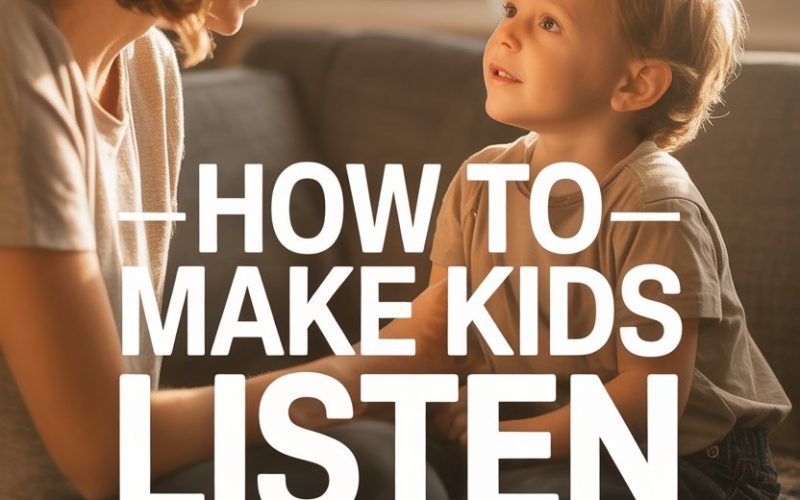Ever feel like you’re narrating to a roomful of goldfish?
You repeat yourself, your voice rises, and still, the washing remains unfolded, shoes litter the hallway, and your small human is treating broccoli as a projectile weapon.
Before you reach for the classic “If you don’t tidy up, no TV for a week!”—pause.
There’s a better way to get kids listening, and it won’t leave anyone grumpy (or plotting a toddler uprising).
Why Threats Backfire More Than an Overcooked Sausage
Threats work… for about three seconds.
Kids may snap to attention when “no ice cream” is dangled over their heads, but what’s really happening? You’re training them to tune you out until the stakes get high.
Plus, as child psychologists keep pointing out, threats can chip away at trust, build resentment, and teach kids to push back—or get sneakier.
What we want is for children to listen because they respect us, not because they’re worried they’ll lose Minecraft privileges.
Connection: The Not-So-Secret Superpower
Kids are wired to cooperate with adults they feel close to. The quickest shortcut to better listening? Spend a few dedicated minutes just being with your child.
This could mean reading a story, tossing a ball, or even letting them brush your hair into something that would terrify your hairdresser.
When kids feel seen and heard, they’re much more likely to return the favour. Harvard’s Center on the Developing Child says that strong relationships are at the heart of all learning and cooperation.
It doesn’t take hours—five minutes of true presence often does the trick.
Speak So Kids Want to Listen
Picture this: your partner says, “Can you just clear the table?” while you’re deep in an email or WhatsApp chat. Annoying, right? Kids are no different. To get their attention, try:
- Crouching to eye level.
- Saying their name.
- Putting a gentle hand on their arm.
Now, keep it short and sweet. “Shoes, please!” works a treat.
The more words you use, the quicker their eyes glaze over. (Try narrating the weather report and see what happens…)
Make Requests, Not Demands
Instead of barking “Tidy your toys NOW!” give a genuine request: “Would you put your blocks back in the basket, please?” This tiny shift in tone gives kids a sense of agency, and most respond better when they feel like they have some say.
If your toddler’s on a “no” bender, turn it into a choice: “Blocks first or books first?” Both roads lead to a tidier lounge.
Routine Is the Unsung Hero
Ever notice how school teachers can wrangle 30 kids without yelling? Routines do half the heavy lifting.
When kids know what to expect, there’s less pushback.
Lay out what’s coming (“After breakfast, teeth and shoes, then out the door”) and, when possible, stick to it.
Visual charts or silly songs work wonders, especially for younger children or those easily distracted by, well, air.
Empathy: The Bridge to Cooperation
No one—child or adult—wants to be bossed around.
When you acknowledge how your child feels, you build the kind of goodwill that makes listening more likely. “I know you’d rather keep building your Lego spaceship. It’s hard to stop when you’re having fun.”
Suddenly, you’re not the villain. You’re the parent who gets it.
And kids who feel understood are more open to direction. Dr. Laura Markham calls empathy the “magic sauce” for peaceful homes.
Choices, Choices, Choices
Whenever possible, offer a choice instead of an order. “Do you want to brush your teeth before or after your bath?” or “Two stories tonight or three short ones?”
Choices give kids a sense of control, and kids who feel in control are far less likely to dig in their heels. (Also, you get to skip the power struggle. Cheers to that.)
Natural Consequences Beat Threats Every Time
Forget “Do this or else.” Let life do the teaching (within reason, obviously—no one’s letting toddlers discover the natural consequences of jaywalking).
If your child refuses to wear a jumper on a brisk morning, pack it in their bag and let them feel chilly for a bit. When kids experience the actual fallout of their choices, they’re more likely to listen next time.
Child development experts recommend this approach because it teaches real-world cause and effect, not just avoidance of punishment.
Use Playful Parenting to Turn Listening into a Game
Kids are wired for fun. Instead of nagging, make listening irresistible: use silly voices, challenge them to “beat the timer,” or pretend you’re robots who must tidy toys before the “lava” (bath time) arrives.
Playfulness lowers resistance and makes you both laugh—which, let’s be honest, everyone needs after a day of negotiations over sock-wearing.
Model the Behavior You Want
Ever been caught muttering about “never being listened to” while scrolling your phone? Welcome to the club. Kids are expert mimics.
Show them what listening looks like: put down your phone, make eye contact, and really hear them out. “You’re telling me about your day—I’m listening.”
When you model respect, it’s much easier to expect it in return.
When Big Feelings Get in the Way
Sometimes, your child’s refusal to listen isn’t about you at all. Maybe they’re tired, hungry, or just had a hard morning at nursery. A meltdown is often a distress flare, not defiance.
In those moments, skip the lecture. Offer a cuddle, sit quietly together, or name what’s happening: “You’re upset. That’s hard.” Once the storm passes, directions are easier to swallow.
Consistency: The Often-Ignored Ingredient
Kids thrive on knowing you mean what you say. This doesn’t mean being rigid—sometimes flexibility is the name of the game—but it does mean following through with reasonable expectations.
If you say “Bedtime is at 8,” stick to it. If you always cave after the fourth “But just one more story,” you’re training your child to keep pushing.
Consistency isn’t glamorous, but it’s gold.
Lighten Up and Drop the Guilt
No parent nails it 100% of the time. You’ll snap, threaten, or bribe with biscuits (who hasn’t?).
The good news: repair is always possible. Apologize, reconnect, and remind yourself you’re human.
Kids are surprisingly forgiving—and they learn as much from your mistakes as they do from your triumphs.
Parenting Without Threats Is Possible (and Worth It)
Ditching threats doesn’t mean chaos reigns or that you become the world’s most permissive parent. It means you’re building trust, teaching respect, and laying foundations for cooperation that last a lifetime.
Next time you’re tempted to drop a threat, try one of these strategies.
Maybe your child won’t listen the first time—maybe you’ll have to repeat yourself (quietly, through gritted teeth).
Over time, though, you’ll see more cooperation, less drama, and perhaps even the occasional “Yes, Mum/Dad!” without any hint of blackmail.
Not a bad trade for a calmer, kinder home—and vocal cords that don’t feel like they’ve done ten rounds at Glastonbury.




